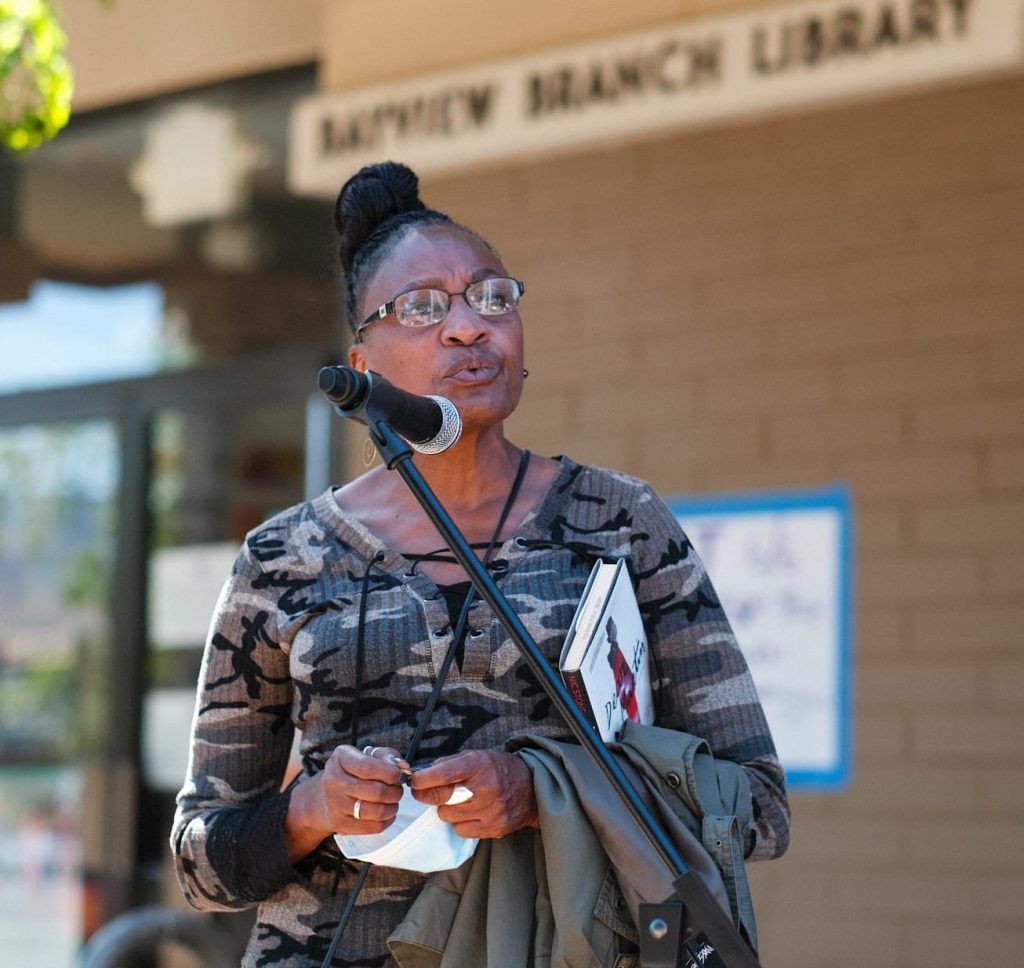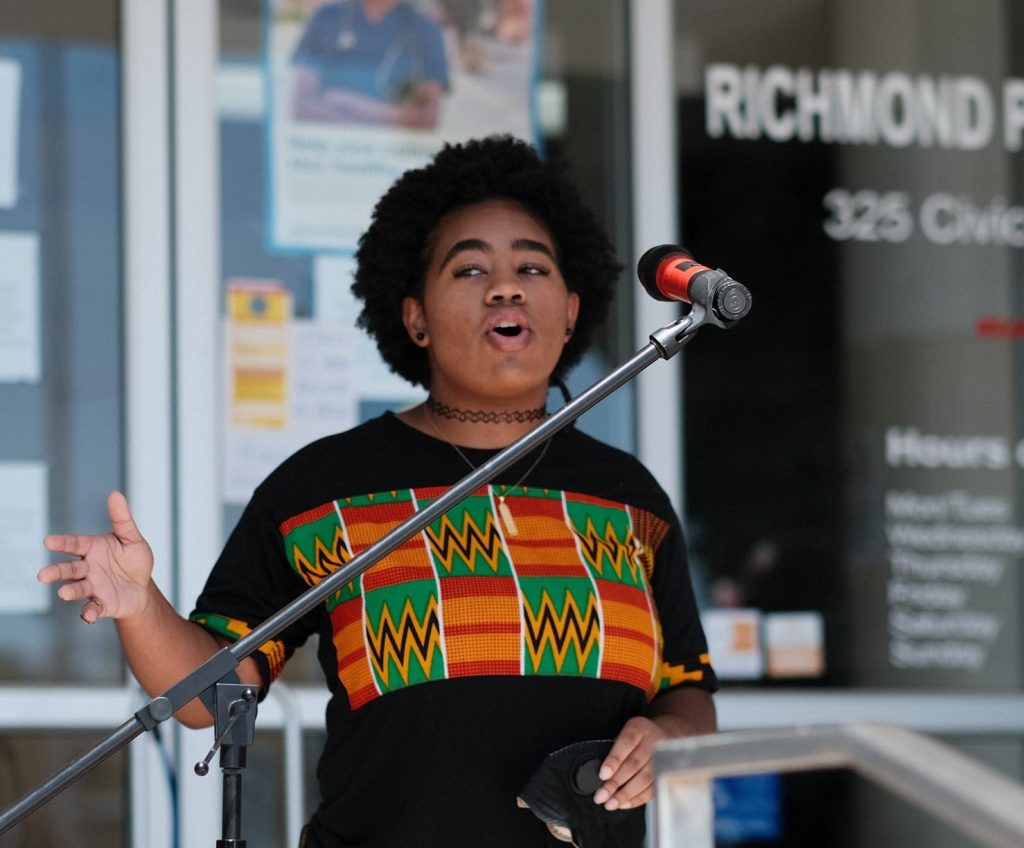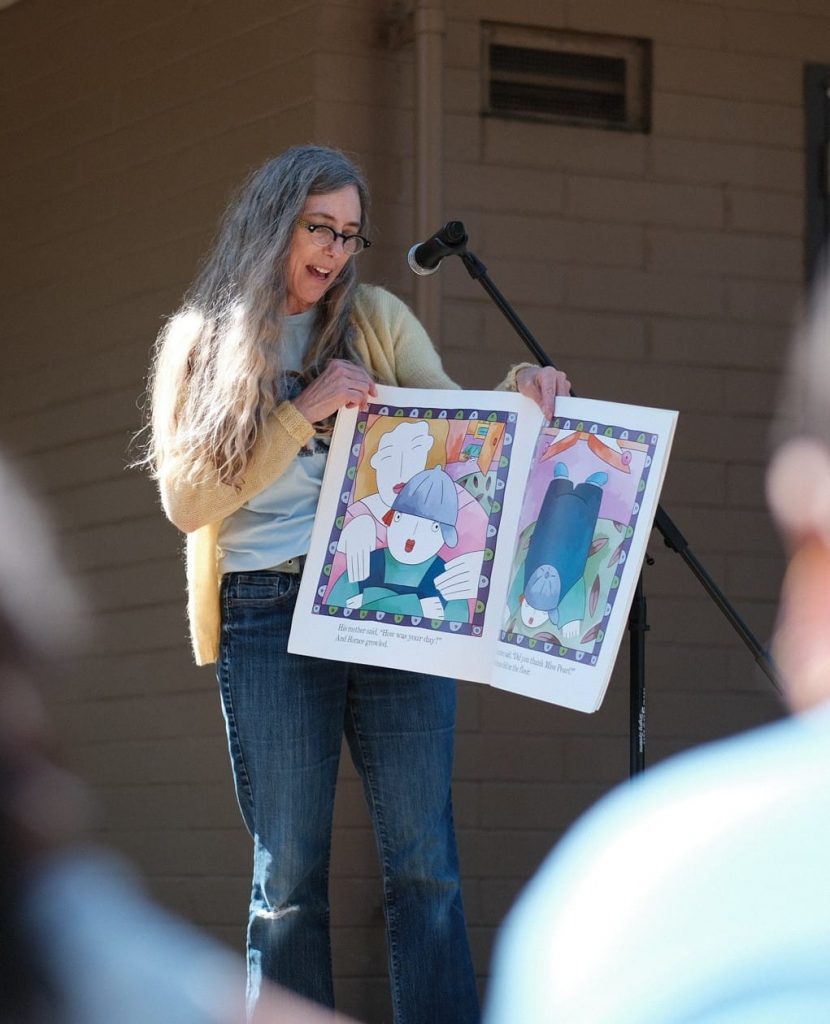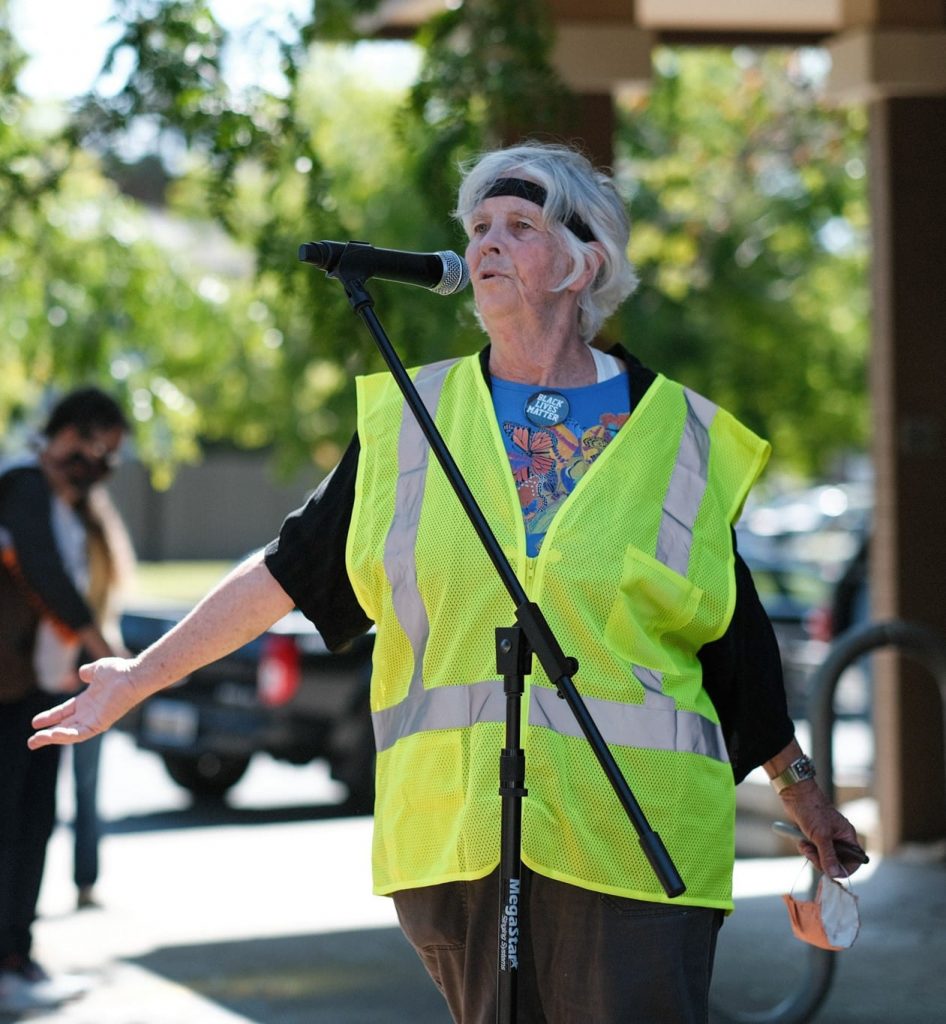News for the East Bay's diverse, working-class majority.
Brought to you by the Democratic Socialists of America, East Bay chapter.
June 15, 2020
Save the Richmond Public Libraries
Art from the Richmond Libraries “Guerilla Storytime” action on June 6, 2020
by Eric Ruud
The city of Richmond, CA, spends $78 million per year on its police force — roughly 40% of the city budget. Less than one-tenth of that amount, or about $7 million annually, goes to all libraries and cultural services combined.
So it may come as a surprise that, especially in a time when demands to defund the police are gaining traction across the country, Richmond Mayor Tom Butt and City Manager Laura Snideman have proposed to solve the city’s looming $27 million pandemic-induced budget deficit by defunding and closing public libraries instead of reducing the police budget.
But city budgets are not just about math. City budgets represent the values and priorities of those who craft them. Efforts to defund the library system and permanently close Richmond’s Bayview and West Side branches reveal that the Mayor would rather police and incarcerate Black and BIPOC working class communities than provide them with the essential resources they need to thrive.
Richmond’s public libraries have already been drastically defunded once before, in 2004, due to a $35 million city budget deficit that was caused by “financial mismanagement”). And in the process, many high-quality union jobs were lost. Now, due to Covid-19, the libraries have been closed since mid-March, and the city’s most vulnerable people have been most impacted by the loss. They lost safe community spaces, after-school programs for children and teens, computers and WiFi, reference and legal materials, and guidance from trained staff who can help people of all ages make sense of a world full of increasingly confusing information.

“What does the public do if they don’t have internet at home, don’t have a job?” Angela Cox, a teen services librarian in the Richmond Public Library System, asked. “There are people who need to file unemployment but they don’t know how to use a computer. These are people with kids and babies who just have no resources if the library is closed. What are they going to do?”
Libraries are essential services
A library is not just a building full of free books. It is a living, breathing hub of essential social services. Library workers build relationships of trust in the community through after-school programs, skills trainings, and outreach programs. Libraries and library workers were already struggling to meet these needs due to the effects of budget cuts, including inconsistent schedules, mostly part-time positions, and high staff turnover. “There needs to be continuity,” Cox said. “We’re not just in there to order books off a catalogue, it’s about knowing what the people you are serving are saying in their schools, what is going on in the community, what other programs are around.”
LaVonia Bobo, a Richmond native and an organizer with Richmond Revolution, was a library aide at the main branch until it was closed to the public in March. She was eleven years old when she first met Angela, but she still remembers Angela’s influence. “I went to Portola Middle School, now called Korematsu,” she said, “and Angela used to come visit us there and read to us, and also at [after-school program] Girls Inc. It wasn’t just at the library. She was part of my life.”

After Bobo graduated from Howard University with degrees in African American studies and political science, she decided to come back home to work in the Richmond Public Library. “I always went to the library as a kid,” she said. “It was my favorite place. So it was so exciting to work there and just get to be around my people in Richmond, to meet new people and see new faces.”
She appreciates the range of needs the library meets for everyone in the community. “It’s extremely diverse,” she said. “There are some people who are houseless, who don’t have a place to be, who might not have access to internet and computers and shelter. A lot of older folks come in just to sit down and read the newspaper. Lots of kids go to the kids’ section. There are programs to help people learn how to read. Some of the people who come here are dealing with mental health issues.”
While this might seem like a recipe for chaos, workers and patrons have stayed committed to making the library a vibrant, friendly, caring place. “There is a real community,” Bobo said. “So it was really confusing, it doesn’t make any sense that the city would be trying to take it away.”

Sheila Dickinson, a children’s librarian who runs a weekly storytime program for kids at each of the three branches, also sees the library’s work as part of a bigger picture of social service: “We have a huge huge problem of how some people are treated in this society, of their access to public spaces. Public libraries should be their allies and their advocates. It’s the reason we’re here: so everyone can feel they are worth someone’s time, worth having a place where they are welcome.”
“Libraries are so basic,” she continued. “It’s bread and butter. There are things that should be basic expectations of a happy life… pools and libraries and parks. There are lots of places that don’t let people have those things unless you pay money. Libraries aren’t like that. We don’t turn anyone away.”
Less funding, more bureaucracy
Retired librarian and labor organizer Tarnel Abbott, who sprung into action in response to the proposed cuts, recalls the long aftermath of the 2004 Richmond budget mismanagement crisis and subsequent restructuring, when hundreds of city employees, mainly union members in SEIU, were laid off. The cuts hit libraries hard, with almost two-thirds of staff being let go, said Abbott: “My friends, my colleagues, my union brothers and sisters.”
Even as finances improved in Richmond, the library cuts got worse. “Every subsequent year the budget was cut,” Abbott said, “positions weren’t filled, and there was this degradation that happened over those years. Loss of staff means loss of open hours, loss of book budgets, all leads to a loss of patrons. I was also very disturbed at the purging of the book collection that was going on. What I saw was a real devastation that didn’t get better when the crisis was over.”
Angela Cox agrees: “Once upon a time, Richmond Public Library was one of the best libraries in the East Bay. The service and training was excellent, you could go apply to any other library and they’d say yes because they knew you got excellent training at Richmond Public Library.”
Over time, she said, the use of the library’s budget has changed too, from favoring staff who worked with patrons and funding for direct services, to more money for a layer of management overseeing fewer and fewer workers. “We used to be open 7 days a week,” she said. “I don’t know how all that changed, but it did. As the front line people became fewer, the managers became more.”
“It’s unjust,” she continued. “It’s not an organic way to lift up the city and the citizenry. For the past few years management just hasn’t been prioritizing the needs of the community. We do have a new director now, and hopefully with proper funding they can turn that around.”
“Librarians are navigators in badly charted territory”
Tarnel Abbott comes from a literary and labor organizing background, and says that she was “saved by books many times.” Her great-grandfather was Jack London. Her grandmother Joan London wrote about César Chávez and the farm workers movement in a book called So Shall Ye Reap. “I grew up on a picket line, of one sort or another” she adds, but it was library work that connected it all together.

“When I was younger I did a lot of cruddy little jobs that paid almost nothing, but as a single mom, I decided I needed to get a career that would keep a roof over my children’s head.” After working at a bookstore, she went back to school and got a degree in library sciences. She said that, after working at libraries in other communities, “when I came to Richmond I felt like I had come home. This is a very diverse community. When I worked in the County system I was stuck in the suburbs and it was very homogeneous. Richmond just felt much more like where I grew up in North Oakland and Berkeley in the 1950s and 60s, much more like home for me.”
Like Cox, she’s upset at the way budget cuts have reduced the vibrant services and community connections libraries can provide. “Twenty years ago, we had much more full time staff than we do now,” she said. “We went out in the community and participated. We used to go to the neighborhoods and bring story time and do puppet shows. We had a media van and would show movies projected on walls for everyone to come watch.”
One of the most important services librarians provide is a kind of informed guidance called “reader’s advisory,” which they use to connect patrons to just the right book or resource. Cox explains, “a mother can come in and say ‘We’re alone so much more right now and I’m looking for a book about lonely children, for someone who is 7 years old,’ and the librarian is trained to help her find that book. Google isn’t the same. You’re going to get so much misinformation and half-truths. Librarians are navigators in badly charted territory of the internet and other worlds.”
Dickinson agrees. “The internet has changed things, but it’s not quite the same as a library, and not the same as a librarian. You can walk up to a librarian and say ‘I need some books about racism for my 5 year old kid because he just said some things I’m appalled about and I don’t know how to talk to him about it. Or you can talk to your librarian and say you need references on tenant law because you’re unable to pay your rent due to the pandemic.”
Refinery town
Richmond has a rich history shaped by petrochemical processing and industrial manufacturing. The environment in which these communities sit is permanently altered by a Chevron refinery that has been there for over one hundred years and still processes 240,000 barrels (38,000 m3) of crude oil every day, spewing toxic chemicals into the air and the water supply.
Its diverse demographics were shaped by the labor demands of the Kaiser shipyards, which during World War II drew large numbers of Black workers from the areas like the southern United States to power Kaiser Steel’s war profits, while those workers battled segregation, redlining, and other forms of racist oppression at home. During the ’60s and ’70s, many Laotian, Vietnamese, Korean, Indian and Chinese immigrants settled. More recently, gentrification in San Francisco forced an exodus of Latinx families from the Mission District, and longtime Richmond residents further from the Bay Area’s centers of commerce, out into Antioch, Pittsburg, and Vallejo. Food deserts and environmental racism are everyday hazards for those who remain in Richmond’s poor and working-class neighborhoods.
“There are still a lot of unacknowledged ethnicities here in Richmond,” says Cox. “So, when you see people who have worked in this community, have a commitment to this community, have a relationship with this community — I think that there’s people that are unseen by others who can be seen, and thrive, and flourish.”
Bobo says that there are numerous ways that Richmond’s Black residents are shown that their lives do not matter. “We all know Chevron,” she said. “They have caused so many problems. We had an explosion near Hercules, it’s literally killing our bodies. Kennedy High School had lead in the drinking fountains just last year. Not Flint, Michigan. Richmond, California.”
Bobo believes the money currently going to the police in the city budget could be better used to provide real health and safety to Richmond citizens. “That $80 million we are giving to the police could go a long way to set up fresh food programs,” she said, “and to help people with transit so they can get to the places that have fresh food and other things people need. It has been proven that crime is happening because of lack of resources. If you have food in your neighborhood, health care, a library, you are going to have a better life.”
“If you’re going to say Black Lives Matter to you,” she continued, “you have to show that they do, not just by stopping the police from hurting us but by providing resources so we can thrive. Shutting down the Richmond library is a way to show that Black Lives don’t matter to you. Taking my library away shows that my Black life does not matter.”
The Save The Richmond Public Libraries Campaign, and how you can help
When word of potential cuts surfaced in May, a coalition of library workers and advocates kicked off the Save Richmond Public Libraries Campaign, organized around the following demands:
- No library cuts
- No layoffs
- Full funding for libraries
- Expand library services
The Save the Richmond Public Libraries campaign has been active throughout May and June to demand that Richmond City Council reject the closure proposal and instead fully fund the library. Earlier this month, East Bay DSA collaborated with the campaign to organize a physically distant “Guerilla Storytime” and car caravan to help connect community members with the campaign.
“Covid is making everything really difficult, so we need to hold onto people. More than anything we need to retain our staff. We need people in power who don’t just say yes or no to a decision, but actually advocate for the idea and support it,” says Cox.
To get involved in saving Richmond’s libraries you can sign this petition to receive ongoing updates.
You can contact your Richmond City Council representative and ask why they want to police Richmond’s residents instead of providing resources for them to thrive.
And you can follow @DSAEastBay on Twitter and Instagram for updates and information about future events.